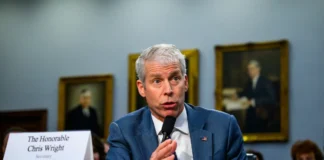U.S. environmental organizations are ramping up legal efforts in anticipation of major confrontations with President Donald Trump’s administration, which is moving swiftly to dismantle federal regulations on fossil fuel development.
These groups say they’re hiring additional attorneys and preparing lawsuits in response to what they see as a barrage of executive orders and emergency actions aimed at rolling back protections for air, water, and wildlife. The administration’s recent strategies include bypassing standard public comment processes and invoking obscure legal authorities to fast-track projects and repeal regulations.
In just the past two weeks, Trump signed an executive order mandating that all current energy regulations be eliminated by next year. He also issued a memorandum allowing agencies to revoke rules without public input. Federal officials have begun notifying companies that they may apply for clean air exemptions via email, exempted several firms from mercury and air toxics standards, approved a contentious oil pipeline project beneath the Great Lakes, and canceled a court-ordered environmental review of oil and gas leases on public lands.
Experts warn these actions may run afoul of the Administrative Procedure Act, which requires agencies to provide public notice and solicit comments before making regulatory changes.
“They’re going full throttle,” said Dan Goldbeck, regulatory policy director at the conservative American Action Forum. “This looks like a legal experiment to test the limits of executive power.”
Earthjustice, one of the nation’s leading environmental law firms, is actively recruiting attorneys to prepare for what it calls a legal showdown. The group currently has ten open lawyer positions and expects to grow its team significantly beyond its existing roster of about 200.
“We’ll be ready the moment agencies try to implement these directives,” said Sambhav Sankar, Earthjustice’s senior vice president for programs. “The president’s plan is blatantly illegal. If an agency tries to follow it, we’ll see them in court.”
David Bookbinder, legal director at the Environmental Integrity Project, echoed that strategy. “We can’t sue over the president’s rhetoric,” he said, “but we can—and will—sue when agencies attempt to act on it.”
The White House declined to comment on the potential for legal challenges.
Last week, the Interior and Commerce Departments provided a potential legal target when they proposed a rule allowing agencies to approve projects that harm endangered species’ habitats, Bookbinder noted. “This is what we’ve been waiting for—something concrete to challenge.”
Some of Trump’s other moves may be harder to contest. Legal experts like Zach Pilchen, senior counsel at Holland & Knight, say efforts to exempt coal plants from pollution limits using a rarely invoked section of the Clean Air Act may present unique hurdles.
“That provision has never been tested,” Pilchen said, referring to the national security exemption included in the 1990 law. “It’s a gray area, and legal recourse may be tricky.”
Still, Earthjustice and other advocacy groups expect to face a steady stream of legal battles over the coming years, citing the administration’s resistance to various court rulings and its aggressive deregulation agenda.



















